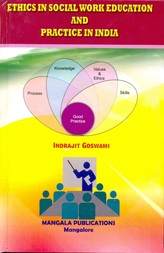|
Indrajit Goswami, pp. 336, Rs. 600, Mangala Publications Historically, all the major religions of the world and their ethics have influenced and guided the traditional social services. But in the later half of the 19th century there was a growing realization to make the services more scientific, secular and humanitarian. As a result all traditional professions had to shift their domains from the cradle of religions to modernity. That transformation has led them to develop a more organized and systematic body of knowledge; specialized training system, professional association and professional ethics. Simultaneously, the established and emerging theories of professions remind us that along with several other attributes, ethics and ethical codes are to play the central role in shaping the destiny of the professions including social work. In the West, especially in the U.S.A. and U.K., the social workers' concern with ethics has matured considerably during the past century and the concerned professional associations in those countries have adopted their own Code of Ethics. But, in India, the profession could neither develop one common Code for all nor reach to any consensus about what should be its shape or form. Except a very few, there is lack of substantial indigenous literature on professional ethics in social work in India. Also there was hardly any empirical evidence which could show whether any particular Code of Ethics had been discussed in the social work institutions in India or any such had been followed in practice or not. While in the West, the academicians and researchers are doing advanced research for finding solutions for ethical dilemmas, in India the practical implications of professional ethics have never been given due attention.
The book is an attempt to respond to longstanding need to a reference book written primarily for the social work students and practitioners. This book would be useful in prepareing them to the challenges faced in the profession. The committment to professional values and ethics does not develop automatically but through a concerned process of building awareness and a favourable attitude among the budding professionals. This volume addresses social work values and ethics in the context of the emerging needs in the developing societies in general and in particicular to the socio-cultural uniqueness of all primary stakeholders of the profession in Indian society. The book is divided into eight chapters covering all important aspects of social work code of ethics, including its hisorical development, maturity process and its compatibility to different practice settings. The book is an outcome of an empirical study which was greatly contributed by several renowned academicians, scholars and social work educators, both from India and abroad. Each of them deserves heartfelt thanks and appreciation. I am grateful to Dr. C.P. Goyal, Rtd. Professor and HOD, Department of Social work, M.G. Kashi Vidyapeeth, Varanasi; Dr. R.R. Singh, Ex-Director and Emeritus Professor, TISS, Mumbai; Dr. P. Ramachandran, Rtd. Professor, TISS, Mumbai; Dr. Rajshree P. Mahtani, Reader, TISS, Mumbai; Prof. Siva Raju, Urban Studies, TISS, Mumbai; Dr. P. Mondal, Senior Lecturer, TISS, Mumbai; Prof. K.K. Jacob, Ex-Principal, Udaipur School of Social Work, Udaipur; Prof. A.S. Inam Sastri, M.G. Kashi Vidyapeeth, Varanasi; Late Dr. Musafir Sing, Rtd. Professor and HOD, Dept. of Social Work, JVBI, Ladnun; Prof. D.K. Lal Das, R.M. College of Social Work, Hyderabad; and Dr. S.B. Saxena, Rtd. Professor, Baroda University, for their valuable suggestions and comments during the course of my study. I am also thankful to Dr. B.L. Agarwal, Rtd. Professor & HOD, Department of Statistics, Maharana Pratap Agriculture University, Udaipur; Dr. A.B. Phatak, Rtd. Professor, Vidya Bhawan Teachers' Training College, Udaipur; Dr. Meenakshi Srivastava, Reader in Statistics, Institute of Social Sciences, Dr. B.R. Ambedkar University, Agra; Dr. P.K. Dashora, Associate Professor, Maharana Pratap Agriculture University, Udaipur; and Dr. Ashok Kumar, Joint Director (PC), NIPCCD, New Delhi, for their expert guidance used in this book. I express my sincere thanks and appreciation to Prof. K.K. Mukhopadhaya, Department of Social Work, University of Delhi, Delhi; Prof. Murli Desai, Head, Social Work Education and Practice Cell, TlSS, Mumbai and Prof. T.M. Dak, Director, Institute of Social Development, Udaipur, for their valuable advice and critical comments towards improving the quality of writing. I feel gratified to record my cordial and warm thanks to Prof. Sarah Banks, Durham University, U.K.; Prof Ian Butler, Keele University, U.K.; Prof. F.G. Reamer, Rhode Island College, USA; and Prof. Tom Wilks, London South Bank University, U.K., for extending their very kind cooperation through internet for searching relevant foreign literature and for sending me the soft copies of their own relevant publications as reference materials. I acknowledge the assistance extended to me by Dr. Subhabrata Dutta, Assam University, Silchar and the librarians and staff members of different libraries for their very kind cooperation and help in my review work. The list of libraries include Sir Dorabji Tata Memorial Library, TlSS, Mumbai; the National Library, Kolkata; Udaipur School of Social Work Library, Udaipur; Ratan Tata Library, University of Delhi, Delhi, and the Central Library, M.L.S. University, Udaipur. I feel it my bounden duty to express my heartfelt thanks to the Principals/Head of the Departments/Directors of all the social work departments/institutes who extended their esteemed cooperation and necessary assistance in data collection. Indrajit Goswami
0 Comments
Your comment will be posted after it is approved.
Leave a Reply. |
20,000 HR PROFESSIONALS ARE CONNECTED THROUGH OUR NIRATHANKA HR GROUPS.
YOU CAN ALSO JOIN AND PARTICIPATE IN OUR GROUP DISCUSSIONS. Categories
All
|
SITE MAP
SiteTRAININGJOB |
HR SERVICESOTHER SERVICESnIRATHANKA CITIZENS CONNECT |
NIRATHANKAPOSHOUR OTHER WEBSITESSubscribe |
MHR LEARNING ACADEMY
50,000 HR AND SOCIAL WORK PROFESSIONALS ARE CONNECTED THROUGH OUR NIRATHANKA HR GROUPS.
YOU CAN ALSO JOIN AND PARTICIPATE IN OUR GROUP DISCUSSIONS.
YOU CAN ALSO JOIN AND PARTICIPATE IN OUR GROUP DISCUSSIONS.
|
|


 RSS Feed
RSS Feed





